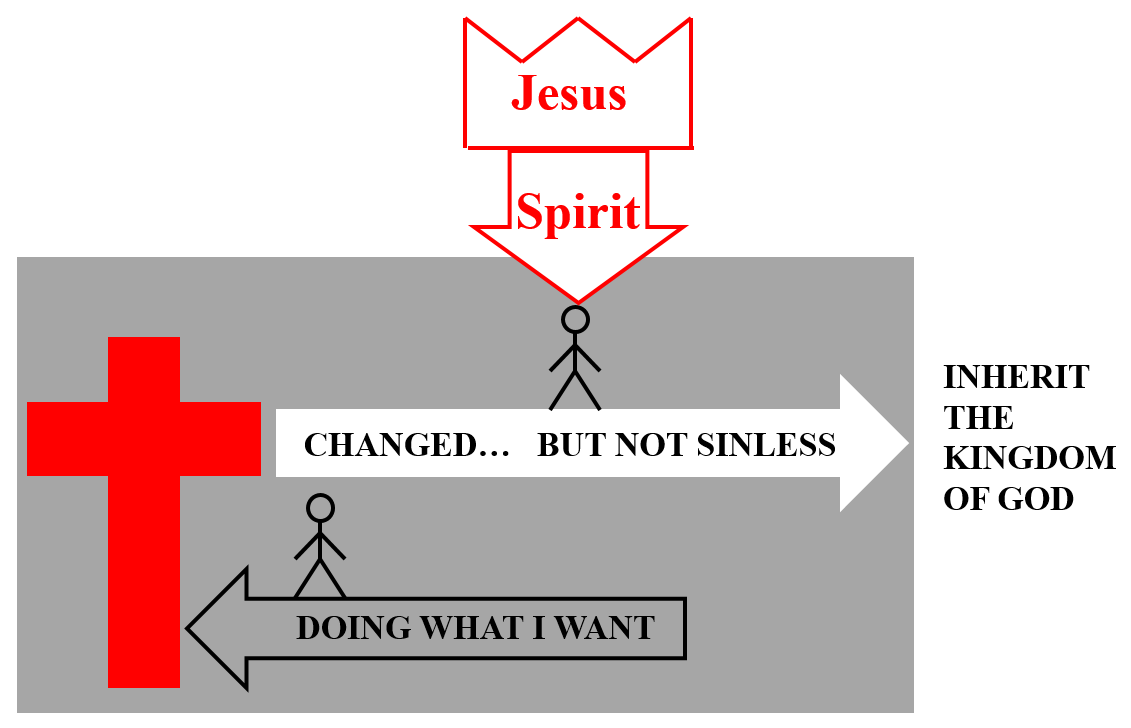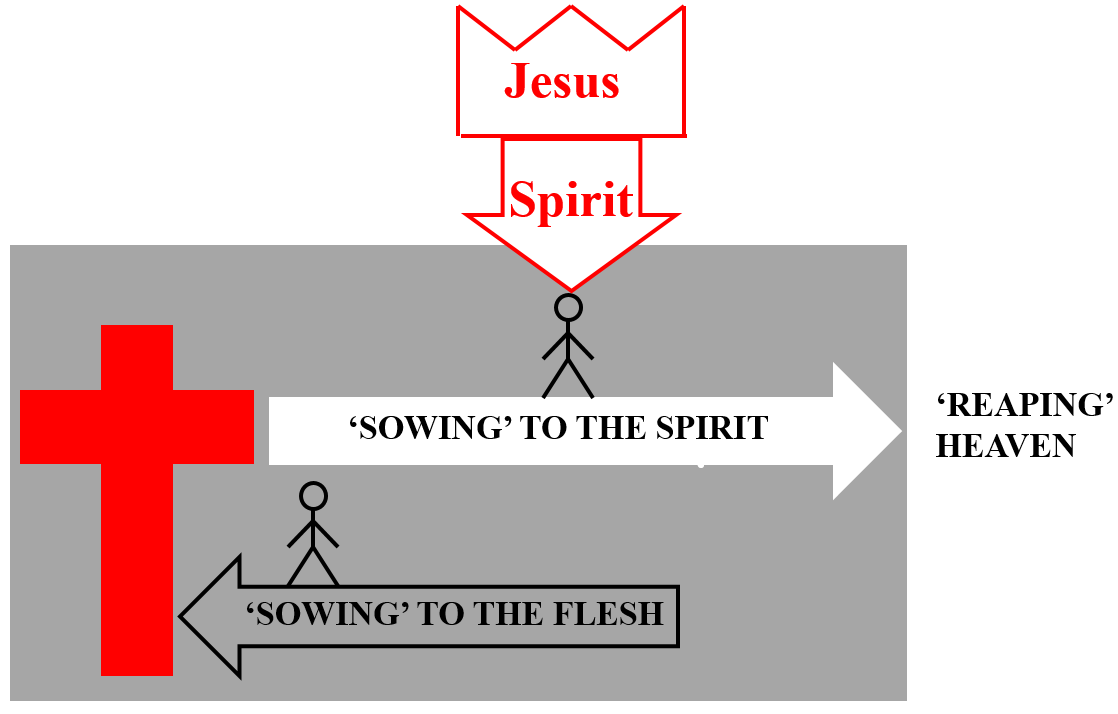Resources
24 March 2024
6:30pm
Living in the light of the cross
You may already have a Bible open, but if you don’t, can I encourage you to open one to page 975, Galatians 6. And let’s pray before we look into this final part of Galatians. We’ve just heard Paul say:
‘Far be it from me to boast except in the cross of our Lord Jesus Christ.’ So, Father, Please continue to teach us tonight about how central and essential the cross is, and teach us to live in the light of it. In Jesus’ name, Amen.
This term, many of the students here were involved in Christian Union (or CU) mission weeks, sharing the gospel of Jesus and the cross on campus. And the CU movement was born from a crucial decision in 1918 by the Cambridge University CU. In those days, it was the only CU in the country, and very small; while the big group was the Student Christian Movement or SCM. And the SCM wanted the Cambridge CU to join it but the Cambridge CU could see that the SCM was drifting from the Bible. So the leaders of the two groups met and the Cambridge CU guys asked this question: ‘Does the SCM put the atoning blood of Jesus Christ [in other words his death on the cross for our forgiveness] central?’ And the SCM guys replied, ‘Well, we acknowledge it, but not necessarily as central.’ And that settled it. The Cambridge CU guys said, ‘We could never join something that didn’t put the cross of Jesus Christ at its centre.’ And so they didn’t join and as a result, the Cambridge CU grew, and also kicked off the movement to see a CU in every university in the country.
And that’s because they understood that the cross is central – because the cross alone makes us acceptable to God, and that in turn changes us to want to live for him. And in Galatians, we’ve seen Paul fighting for the same truth because the churches he’d planted in Galatia were being unsettled by these people we’ve called the ‘Judaisers’. And we’ve called them that because they were Jews who said that unless you were living under the Old Testament law, (1) You weren’t really fully accepted by God, and (2) You couldn’t really live to please God. And in Galatians, Paul’s answer has been: To (1) Jesus’ death, if you’re trusting in him, has made you fully acceptable to God forever – whereas the Old Testament law can’t, and was never meant to. And to (2) when God by his Spirit opens your eyes to what Jesus did for you on the cross, it changes what you want, and you find yourself wanting to please him in a way you didn’t before.
So, the big message of Galatians is that the cross is central – because it alone makes us acceptable to God, and that in turn changes us to want to live for him. And we began to see what that changed life looks like last week. So look at Galatians 5.22-24 for a reminder:
But the fruit of the Spirit [the fruit that comes from the Spirit opening your eyes to how Jesus loved you on the cross] is love, joy, peace, patience, kindness, goodness, faithfulness, gentleness, self-control; against such things there is no law. And those who belong to Christ Jesus have crucified the flesh with its passions and desires.
In other words, we’ve said a decisive ‘No! Death to you!’ to our sinfulness. Because seeing the judgement Jesus had to take on the cross for our sinfulness makes you want to leave behind your sinfulness. And yet, inconsistently, we still sin, don’t we? So, Galatians 5.25:
If we live by the Spirit, let us also walk by the Spirit.
And then Paul spells out very practically what that will look like in the life of a church family, in our relationships with one another. And it’s all about: Living in the light of the cross
1. See yourselves in the light of the cross (Galatians 5.26)
Look at Galatians 5.26:
Let us not become conceited, provoking one another, envying one another.
So if I’m conceited, it means I have a falsely high opinion of myself – probably from falsely comparing myself with others. In which case, I’m likely to provoke you because, one way or another, I’ll let on that I think I’m better than you, more godly than you, and that you should be living your Christian life like me. And if you fall for that, you’re likely to end up envying me – thinking ‘I wish I was living his Christian life instead of my own low-level one.’ And all that was most likely going on in these Galatian churches because of the Judaisers. Because some of the Galatians had already bought in to living under the Old Testament law.

And, like this picture, one way or another, they were probably saying ‘So we’re the gold medalists, doing the law. Whereas the rest of you are just silver and bronze.’ And if your understanding of the gospel was wobbly, it would be easy to envy them and feel second class. And the way to avoid all that is to see ourselves in the light of the cross, because here’s the real picture:

The real picture is that all of us are on level ground at the foot of the cross. The real picture is that all of us are sinners equally in need of the cross. So on the one hand, you may be further ahead as a Christian than others here – in godliness, in prayer, in all sorts of ways (although that may be because you’ve been a Christian longer, or had the privilege of a Christian background). But you need to know that you remain equally a sinner in need of the cross. And actually, the spiritually healthy become more aware of their sinfulness as they get to know Jesus better – not less. So don’t be conceited and feel superior.
But on the other hand, you may feel you’re the most rubbish Christian here, still messing up left right and centre, still struggling with baggage from the past, and thinking you’ve got nothing to offer here. And you need to know that everyone else here is a sinner equally in need of the cross. So don’t envy, or feel you’re inferior or that you don’t belong. We all belong equally at the foot of the cross. That’s the first thing that’ll really change our church family and our relationships: Seeing ourselves in the light of the cross. Then:
2. Treat one another in the light of the cross (Galatians 6.1-6)
Look on to Galatians 6.1:
Brothers [and sisters is also implied in the original word], if anyone is caught in any transgression, you who are spiritual should restore him in a spirit of gentleness. Keep watch on yourself, lest you too be tempted.
Let me clarify two things. One is that when it talks about someone being caught in any transgression, it most likely doesn’t mean you’ve caught a fellow-Christian in the act of some sinful action. It means they’ve been caught up in some sinful action – and maybe have told you about it, to seek your help. Then the other thing is that you who are spiritual isn’t a great translation because that sounds like some elite group within the church family. But literally, it’s ‘you who have the Spirit’ – which is just Paul’s way of describing all Christians. So this is something all of us will need to do for someone, sometime. So for example, I remember a student long ago (I’ll call him John) who disappeared off the radar here at church. So I phoned and emailed and got no reply. So I finally dropped in on him, and he told me that he’d had this piece of awful news from home. And completely against character, he’d gone out, got blind drunk and ended up in bed with a girl. What would you have thought if he’d been telling you? The sinfulness in us might think ‘You idiot. I can’t believe you’ve done that. How could you?’ But if I think like that, I’ve already become conceited again, already forgotten to see myself in the light of the cross – already forgotten that I’m equally a sinner in need of the cross, equally a sinner capable of that sin, let alone many others. Isn’t that why Galatians 6.1 says:
Keep watch on yourself, lest you too be tempted.
And if I think like that, I’m not treating John in the light of the cross because Jesus went to the cross to see John forgiven and restored as many times as John needs forgiving and restoring between now and heaven. Which is why he calls on me to restore him in a spirit of gentleness. I heard someone preaching on this say ‘It’s sad when Christians fail – which we all do. But it’s even sadder when their Christian brothers and sisters fail to restore them – either by ignoring it as none of their business, or by a judgementalism that only makes the sense of failure worse. Onto Galatians 6.2:
Bear one another's burdens, and so fulfil the law of Christ.
So Galatians 6.1 is a particular example of that – bearing the burden of helping one another in our failures. But there are countless other burdens among us. Like the burden of unemployment, or the burden of responsibility or over-pressure at work, the burden of unwanted singleness or homosexual feelings or the burden of a difficult marriage, or the burden of children who are sick or disabled, or the burden of infertility. Or the burden of bereavement, the burden of caring for elderly parents or relatives and facing their deaths, the burden of getting old ourselves and ultimately facing our own deaths, the burden of the way a broken home or broken marriage has affected you and continues to. And so on. And bear one another’s burdens simply means: get thoroughly involved in one another’s lives, so that everyone feels their burdens shared and lifted by being understood and encouraged and helped. But that costs, doesn’t it? Because it means taking on a burden that isn’t mine, and that I didn’t have to. But that’s exactly what Jesus did for us on the cross, isn’t it? 1 Peter 2.24:
He himself bore our sins in his body on the tree
And to treat one another in the light of the cross, we will take on burdens that aren’t ours and that we didn’t have to – just like Jesus did for us. So, Galatians 6.2:
Bear one another's burdens, and so fulfil the law of Christ.
And think of the word ‘law’ in inverted commas there because after all Galatians has said about us not living under the Old Testament law, it’s very unlikely that Paul would suddenly say ‘But by the way there is a replacement set of laws for you to live under – the law of Christ’. I haven’t time to explain why, but I agree with those who think that Paul is using the word law here to mean ‘ruling principle’. And that he’s saying if you’re a Christian, the ruling principle in your life is Christ. And he’s still answering the Judaisers who want to know what’s going to rule your life if it’s not the Old Testament law. And Paul’s answer is: Christ will. Christ is my law. By which I don’t just mean his teaching – although that’s part of it. I also mean the cross and what he’s done for me. Because that shapes my life like nothing else. Which is why bearing one another’s burdens ‘fulfils’ what Jesus’ sin-bearing on the cross calls for from us. But Paul then speaks to those who feel too important for at least some kinds of burden-bearing – happy to step in and lead home group – that’s our level; but doing tea and coffee at church – that’s beneath us, that’s for others. So Galatians 6.3:
For if anyone thinks he is something [that’s what he tells himself], when he is nothing [that’s what the gospel tells him – he’s nothing but a sinner and yet loved to death by Jesus], he deceives himself.
So we’re back in conceit again. So what’s the antidote? Galatians 6.4:
But let each one test his own work, and then his reason to boast will be in himself alone and not in his neighbour.
In other words, don’t evaluate your Christian life by comparing yourself with your Christian neighbour – but by testing yourself against what you could and should be. Galatians 6.5:
For each will have to bear his own load.
In other words, we’ll each answer to God for how we used our lives. It’s not our business how that compares with others. It’s not our business to ask, ‘Well, why aren’t they bearing that burden?’ Then Paul mentions one more particular example of burden-bearing in Galatians 6.6:
One who is taught the word must share all good things with the one who teaches.
So, as he spells out elsewhere, Paul assumes that the one who teaches the church family (the teaching elder) should be financially supported by the church family. That way he can be freed up to use his gifts for the maximum benefit of the church family. And that is a financial burden on the church family. But, again, that burden needs treating in the light of the cross. Because if Jesus paid with his life so that there could be a gospel, that calls on us to pay with our money so that there can be effective ministry of the gospel – here and elsewhere.
3. Don’t deceive yourself in the light of the cross (Galatians 6.7-10)
Look on to Galatians 6.7-8:
Do not be deceived: God is not mocked, for whatever one sows, that will he also reap. For the one who sows to his own flesh will from the flesh reap corruption, but the one who sows to the Spirit will from the Spirit reap eternal life
Paul is now wrapping up everything he’s said from halfway through Galatians 5 about how Jesus changes us. And he’s still answering the Judaisers who said, ‘If you preach that God’s acceptance of people depends 100% on the cross and 0% on them, they’ll just go out and sin.’ And Paul has already warned us that if we do just go out and sin, it’s evidence that we don’t yet know Jesus at all. So just look back to Galatians 5.19-21, where Paul said:
Now the works of the flesh are evident: [And then comes that list of sinful behaviours. And, end of Galatians 5.21 he says:] I warn you, as I warned you before, that those who do such things will not inherit the kingdom of God.

And last week, I used this picture to explain that. So there on the bottom arrow is someone before they know Jesus, and their direction in life is doing what they want. But then they hear the gospel, and as God by his Spirit opens their eyes to what Jesus did for them on the cross, it changes what they want. And it turns them round onto the top arrow, with a new direction and new desires to please Jesus – although sin is still possible, and they do still sin. But Paul’s point is that if you do just go out and sin, if that’s your direction of life, then it’s evidence that you’re actually still on the bottom arrow, and that if you’re thinking ‘It’s OK: I’m accepted through the cross’, you’re deceiving yourself. So now look back to Galatians 6.7-8, where he repeats the same warning:
Do not be deceived: God is not mocked [in other words, he’s never fooled; we can fool ourselves about our spiritual state, but he knows it with 100% accuracy], for whatever one sows, that will he also reap. For the one who sows to his own flesh will from the flesh reap corruption, but the one who sows to the Spirit will from the Spirit reap eternal life

So there’s the picture again. Only he’s switched from talking about following the desires of the flesh (in other words our sinfulness) to sowing to the flesh. And from talking about following the desires of the Spirit to sowing to the Spirit. But it’s the same idea. And he wants us to ask ourselves: Which arrow am I really on? And to those who can say, thanks to God’s work in their lives, ‘I’m on the top arrow’, Paul goes on, Galatians 6.9-10:
And let us not grow weary of doing good, for in due season we will reap, if we do not give up. So then, as we have opportunity, let us do good to everyone, and especially to those who are of the household of faith [in other words, the church family – here but also worldwide].
And from verses like that, Richard Dawkins accuses Christians of showing the worst kind of ‘in-house’ love – love that only cares for others in the club. But look at Galatians 6.10 again. In the light of the cross, where God so loved the world, we’re to do good to everyone (which means everyone), and where it says and especially to those who are of the household of faith, does that make it easier or harder? Because we don’t choose our siblings in the household of faith, do we? The church isn’t a club of our making, but a family of God’s making. And if we really work at doing good to everyone in this family, which is full of all kinds of people with all kinds of failures and burdens and needs, we’ll be loving in a very stand-out way. So last point:
4. Believe uncompromisingly that the cross alone puts us right with God
Look at Galatians 6.11:
See with what large letters I am writing to you with my own hand.
So up till now, Paul would have been dictating this letter to one of his assistants. That was standard practice. But then he takes the pen, or quill or whatever, to add the final paragraph – in big, bold letters as if to say ‘If you get nothing else, get this. This is the burden of the whole letter.’ And he says: I want you to see what the Judaisers are saying about the cross – and, by contrast, what I’m saying about the cross. So first the Judaisers, Galatians 6.12-13:
It is those who want to make a good showing in the flesh who would force you to be circumcised, and only in order that they may not be persecuted for the cross of Christ. For even those who are circumcised do not themselves keep the law, but they desire to have you circumcised that they may boast in your flesh
So Paul is saying what the Judaisers really want is the acceptance of the Jewish world. And they knew that the gospel of the cross of Christ would get them persecuted by the Jewish world because the gospel said that circumcision and living under the Old Testament law couldn’t make you acceptable to God – that’s why Jesus had to die. And that was so offensive to the Jewish world that the Judaisers were prepared to compromise the gospel of the cross. A bit like those guys I began with in the Student Christian Movement – who said: ‘Well, we acknowledge the cross, but not necessarily as central.’ And the gospel of the cross will offend all the world’s religions and all the world’s morality – because it says none of it can make people acceptable to God. So the pressure will always be on us to compromise the gospel of the cross. To which Paul says: Here’s what I’m saying about the cross (Galatians 6.14):
But far be it from me to boast [to value and rejoice in anything] except in the cross of our Lord Jesus Christ [because the cross is central and the cross alone can put us right with God. And he adds:], by which the world has been crucified to me, and I to the world.
In other words, ‘my previous relationship to the world (where I wanted its acceptance and approval and where I wanted to be comfortable in it and belong), that relationship is finished, dead, ‘crucified’. Because whatever the world thinks of the cross, I know it’s true for everyone and needed by everyone. And I won’t compromise it for anything.’ For, Galatians 6.15:
For neither circumcision counts for anything, nor uncircumcision, but a new creation.
So look at all the world’s religions - from cutting off a foreskin to fasting in Ramadan to meditating in Buddhism - and when it comes to making people acceptable to God, it all counts for nothing. And look at all the world’s moralities, and the same is true. The only thing that counts is a new creation – which means when God by his Spirit opens your eyes to what Jesus did for you on the cross, and it changes you. It makes you a new person, accepted by God and wanting to live for him in a way you never did before. That was Paul’s rule of life: To believe uncompromisingly that the cross alone puts us right with God. And as he closes Galatians, he prays a blessing on those who do the same (Galatians 6.16-18):
And as for all who walk by this rule, peace and mercy be upon them, and upon the Israel of God. From now on let no one cause me trouble, for I bear on my body the marks of Jesus. The grace of our Lord Jesus Christ be with your spirit, brothers. Amen.
